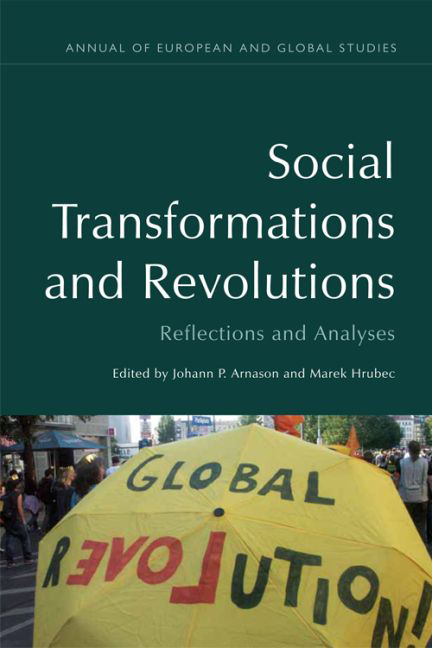Book contents
- Frontmatter
- Contents
- 1 Introduction
- 2 A Trialogue on Revolution and Transformation
- 3 Revolutions, Transformations, Civilisations: Prolegomena to a Paradigm Reorientation
- 4 The Transformation of Capitalism and the Limits of Democracy
- 5 From Civilisational Crisis to Revolutionary Transformation?
- 6 Environmental Crisis and Political Revolutions
- 7 Communists and Social Democrats in the Hungarian Soviet Republic
- 8 Can Political Participation Become Dangerous for Democracy? Participatory Experiences in Brazil and the Reactions Against Them
- 9 Hidden Revolutionary Processes in 1990s India?
- 10 Matching Reforms of Political and Economic Systems of China
- Notes on the Contributors
- Index
8 - Can Political Participation Become Dangerous for Democracy? Participatory Experiences in Brazil and the Reactions Against Them
Published online by Cambridge University Press: 15 September 2017
- Frontmatter
- Contents
- 1 Introduction
- 2 A Trialogue on Revolution and Transformation
- 3 Revolutions, Transformations, Civilisations: Prolegomena to a Paradigm Reorientation
- 4 The Transformation of Capitalism and the Limits of Democracy
- 5 From Civilisational Crisis to Revolutionary Transformation?
- 6 Environmental Crisis and Political Revolutions
- 7 Communists and Social Democrats in the Hungarian Soviet Republic
- 8 Can Political Participation Become Dangerous for Democracy? Participatory Experiences in Brazil and the Reactions Against Them
- 9 Hidden Revolutionary Processes in 1990s India?
- 10 Matching Reforms of Political and Economic Systems of China
- Notes on the Contributors
- Index
Summary
Brazil: a recent and weak democracy
IN BRAZIL, POLITICAL participation is a recent phenomenon, overcoming a long tradition of apathy among the population with regard to politics. Although a National Health Council was created in 1930 and some national conferences on specific issues, in which citizens participated directly, had been held since 1941, these were local experiences, with sporadic activities and few people involved. In the late 1970s, still under the military dictatorship (1964–85), social movements and some organisations like churches and professional bodies began to demand what they called a ‘right to participate’ in the control of the state and the decision-making processes of public policy. Although their demand was unsuccessful at that time, popular councils were created in some cities. These experiences of voluntary participation were generally parallel, external and opposed to state agencies. In many segments of society, however, there was a growing desire to have more voice and influence in public affairs, even if the concepts were very different about how this right would be implemented.
A landmark for these aspirations was a national health conference that took place in 1986, soon after the return to democracy. It emphatically recommended the creation of a national health assistance system, with the direct participation of government agents, health care professionals and users of the new system. The implementation of this recommendation was the embryo of a new participation space called the public policy council. The Federal Constitution from 1988 created many different instruments to involve stakeholders directly in the formulation and management of specific policies by foreseeing direct participation in them. It paved the way for claims of power-sharing in many different areas, totalling around thirty articles that encouraged experiments in participatory public management. In addition to these policy councils, conferences continued to be held, and in 2001 mandatory participation in the masterplans of cities, expanding the formal channels of participation, was introduced.
Probably the best known mode of participation is participatory budgeting. It was first implemented in Porto Alegre in 1990 and quickly expanded to involve around 170 cities in Brazil (Ribeiro Torres and Grazia 2003). Although it is often associated with the Workers’ Party, participatory budgeting was implemented by local governments from various political currents.
- Type
- Chapter
- Information
- Social Transformations and RevolutionsReflections and Analyses, pp. 148 - 167Publisher: Edinburgh University PressPrint publication year: 2016



